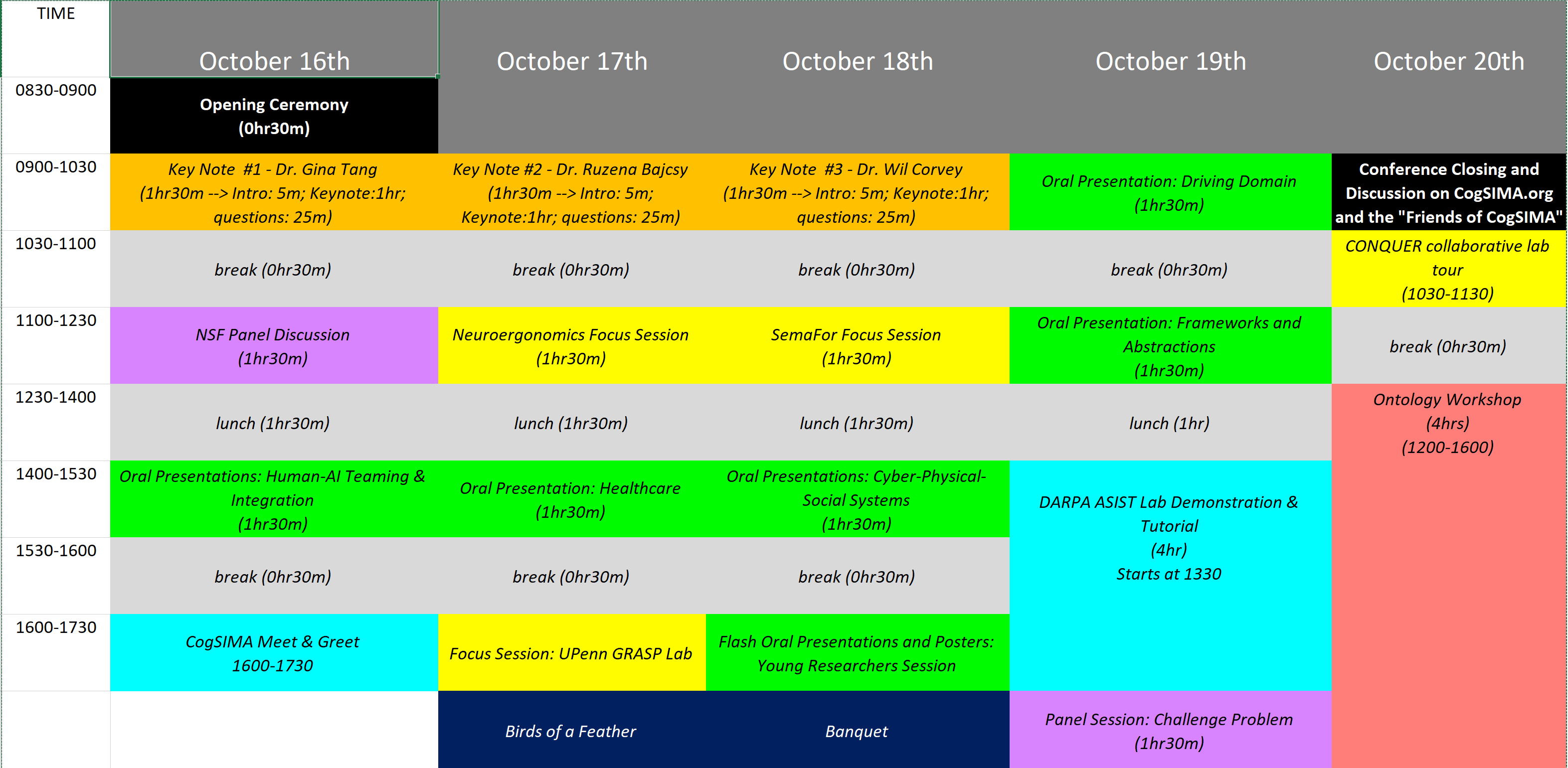Program Schedule
NOTE: The following program schedule is in draft form and may go through significant changes before being finalized. If you are participating in the conference and are unable to make the day or time your session please reach out to the organizing committee via admin@cogsima.org as soon as possible so we can adjust the schedule to accommodate.
Details about Keynotes, Tutorials, Focus Sessions, and Panel Presentations can be found under the “PROGRAM” menu item at the top of the page.

Oral Presentations
- Human-AI Interaction & Teaming
- Joshua Bhagat Smith, Simone Angelo Toribio and Julie Adams. Uncertainty-Aware Visual Workload Estimation for Human-Robot Teams
- Mare Teichmann, Jaanus Kaugerand, Johannes Ehala, Merik Meriste and Kalev Rannat. Effects of Culture on Public Behavior Patterns in Crisis Situations
- Chris Landauer. Autonomous Computational Partners
- Mustafa Demir, Chun Kit Chan, Sean M. Leahy, Punya Mishra and Abhishek Singharoy. Adaptive Artificial Intelligence to Teach Interactive Molecular Dynamics in the Context of Human-Computer Interaction
- Healthcare
- Mahdi Ebnali, Nicole Duggan, Madeline Schwid, Andrew Eyre, Lauren Selame, Munna Dashti, Andrew Goldsmith and Roger Dias. Objective Assessment of Point-of-Care Ultrasound (POCUS) Competency Using Arm Motion Data and Machine Learning Classifiers
- Mahdi Ebnali, Nima Ahmadi, Shiva Pourfalatoun, Abdullah Al-Taweel and Hamid Shokoohi. Clinician-AI Collaboration for Decision Support in Telemedicine
- Danielle Taana Smith, Lee W. McKnight, Stefano Cattani, Alvaro Salas-Castro and Jane A. Appiah-Okyere. COVID-19 Cognitive Cloud to Health Systems Strengthening by Costa Rican Community Design
- Cyber-Physical-Social Systems
- Crystal M. Fausett, Jenna M. Korentsides, Sabina M. Patel, David Schuster, Elizabeth H. Lazzara and Joseph R. Keebler. Investigating Team Level KSAs in Cybersecurity: Insights from Observing a Cybersecurity-Themed Board Game Pilot Study
- David Schuster, Crystal M. Fausett, Jenna Korentsides, Sabina Mitesh Patel, Elizabeth H. Lazzara and Joseph R. Keebler. Exploring Cognition and Proficiency in Cybersecurity Incident Response: Description of a Subject-Matter Expert Interview
- Mare Teichmann, Johannes Ehala, Jaanus Kaugerand, Merik Meriste and Kalev Rannat. Let’s Add Highly Stressed People to the Cyber-Physical-Social System
- Emma McDaniel and Alicia Ruvinsky. Building Holistic Situation Awareness through Large Language Models
- Driving domain
- Abderahman Bejaoui and Dirk Söffker. Situated and sequential planning and prediction of human driving behavior as decision making support system
- Ruth David and Dirk Söffker. Comparison of different hyperparameter optimization methods on driving behavior recognition
- Ruth David and Dirk Söffker. A modified Hidden Markov Model (HMM)-based state machine model for driving behavior recognition: Effectiveness of features using different sub-HMMs
- Frameworks and Abstractions
- Ada Diaconescu, David King, Kirstie Bellman, Christopher Landauer and Phyllis Nelson. Towards systems that dynamically change and evaluate abstractions
- Giuseppe D’Aniello and Matteo Gaeta. Situation Identification using Context Space Theory and Decision Tree
- Gerhard Backfried, Dorothea Thomas-Aniola, Martin Boyer, Rüdiger Hein, Michael Suker, Michael Zinkanell, Amir Tatabaei, Philipp Agathonos and Diego Pilutti. Multidisciplinary framework for semi-automatic risk assessment in military operations and civilian missions
- Scott Humr, Mustafa Canan and Mustafa Demir. A Quantum Decision Approach for Human-AI Decision-Making